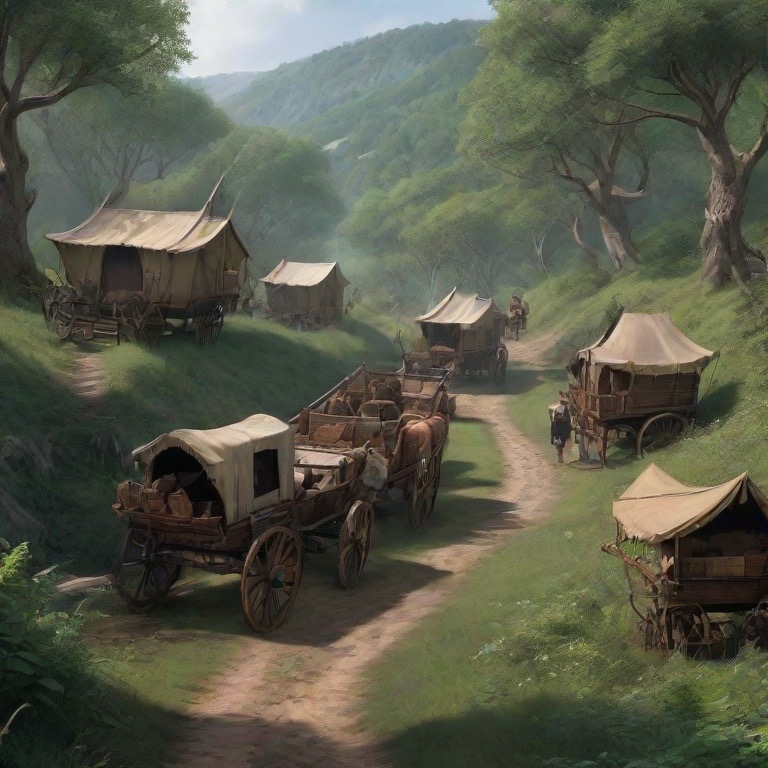Daijin
Builders of the Roads, Nomadic People of the Northern Mainland Coast
Daijin people have tawny skin with warm red undertones. they tend to have smaller eyes and defined cheekbones. They share Dynastan roots with the Shiman people. A key difference between the cultures is that the Shiman settled Echose after the Dorh A'Das evicted the Gaul from northern Dynastes in the Second Era. The Daijin plan routes instead of planting roots. As the dark aelfe empire known as the Manastrife Union formed to the west, the Shiman settled the north marshes of Gaul. The Daijin were less ready to stay within the peat and mud. They travel as nomads, finding routes from Echose, follow the coast all the way down to Vargen. Many Vohkin farms in The Gaulan Plains rely on the seasonal, nomadic migration of the Daijin to work their fields.
The most notable Daijin family is the Boggan line living in Retch. One of the Six, Yvonet Boggan was born of Shiman descent but the shared heritage and marriage alliance have diversified the matrilineal line to be both Shiman and Daijin.
The Daijin are a nomadic and independent people, much of the roads from Echose to Vargen were built by these people. They are known for their hard work and their ability to thrive in the marshes, desert, plains or forests. They are also known for their free spirit and their desire for adventure and exploration. Above all else, freedom and travel are of utmost importance to them. These people have upgraded their carriages for all dire situations. Rain water collection, extended tent tarps, ropes between carriages to move between vehicles and also to dry clothes on the road. The convoy moves and lives as a unit. Flotillas were created to enter the shallow waters north if The Firefang Jags to avoid the steep cliffs and ashen air while traversing the coast.
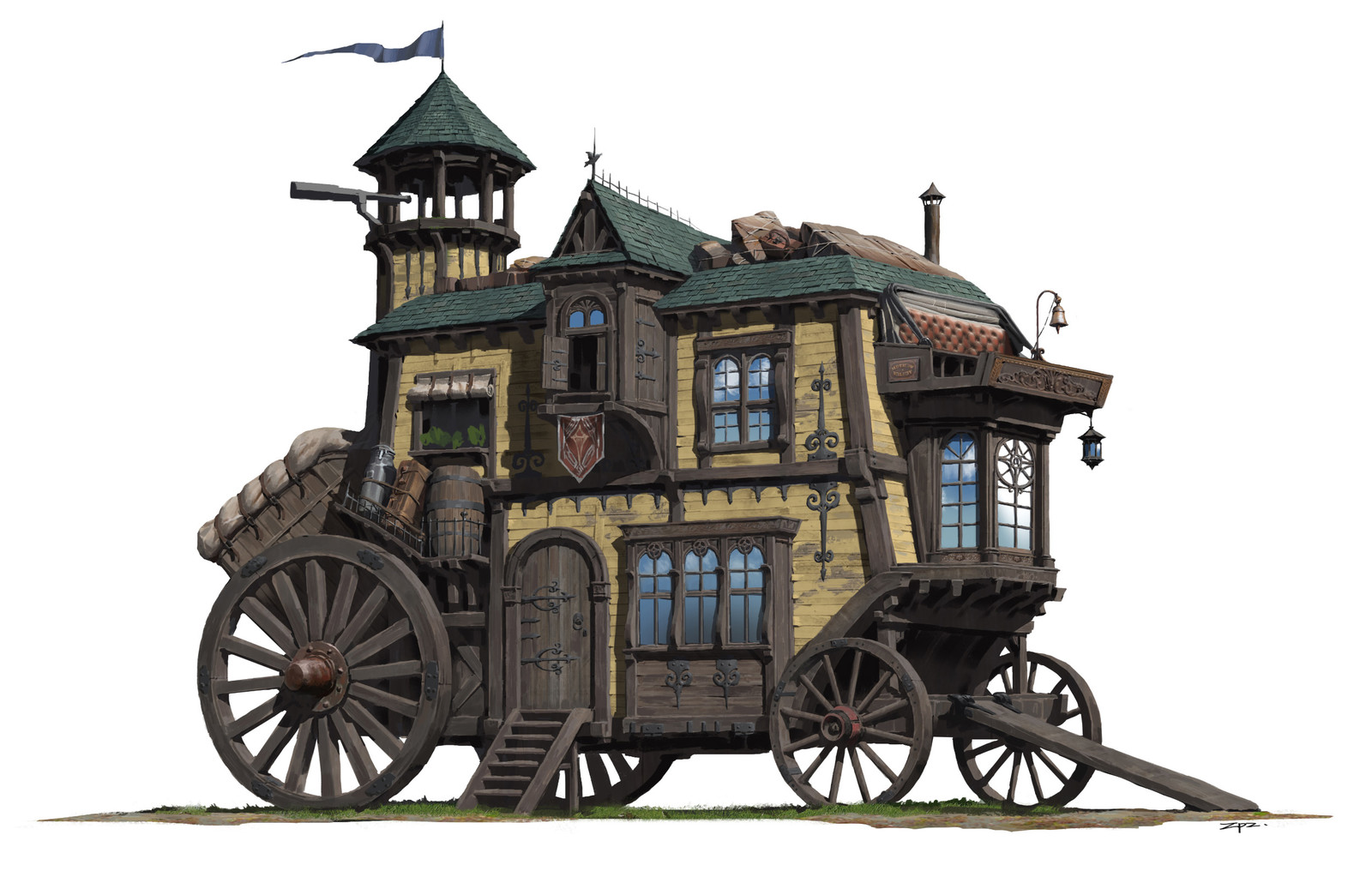 The Daijin are a communal people who value the contributions of each member of their society. They believe that everyone has a role to play and that each role is equally important. They maintain reverence for the spirits, a belief system that comes from their Dynastan ancestors. like many gaul on the mainland, they worship Dhara, god of Liberation. In their minds, the freedom to come as you go and call the family alongside you home is true freedom and liberation.
Daijin culture is marked by a love of music, dance, and storytelling. They have a strong tradition of oral history, and many of their stories are passed down through generations. They also have a tradition of wearing intricate and colourful clothing, often adorned with symbols and patterns that they have gained from the various people they meet. Aelvan trinkets, Siroccan talismans and Ogre totems hang from the garbs styled like the Shiman as the Daijin expand their networks to all cultures along their roads. The garbs tend toward greens from the dyes procured in Echose, Incantum and Vargen with a dash of yellow from the merchants of Calua.
These caravans usually move slowly along the coast. While a small faction may use horses, usually large, strong animals are used to pull the wagons. Bison, cow and ox for instance. Once a caravan stops for the evening, some members go hunt and forage, some setup the tents while others begin to cook for everyone. If they stop near a settlement, they take their strongest ox and put all their wares on a wagon for the expert negotiators to sell to the locals.
The Daijin are a communal people who value the contributions of each member of their society. They believe that everyone has a role to play and that each role is equally important. They maintain reverence for the spirits, a belief system that comes from their Dynastan ancestors. like many gaul on the mainland, they worship Dhara, god of Liberation. In their minds, the freedom to come as you go and call the family alongside you home is true freedom and liberation.
Daijin culture is marked by a love of music, dance, and storytelling. They have a strong tradition of oral history, and many of their stories are passed down through generations. They also have a tradition of wearing intricate and colourful clothing, often adorned with symbols and patterns that they have gained from the various people they meet. Aelvan trinkets, Siroccan talismans and Ogre totems hang from the garbs styled like the Shiman as the Daijin expand their networks to all cultures along their roads. The garbs tend toward greens from the dyes procured in Echose, Incantum and Vargen with a dash of yellow from the merchants of Calua.
These caravans usually move slowly along the coast. While a small faction may use horses, usually large, strong animals are used to pull the wagons. Bison, cow and ox for instance. Once a caravan stops for the evening, some members go hunt and forage, some setup the tents while others begin to cook for everyone. If they stop near a settlement, they take their strongest ox and put all their wares on a wagon for the expert negotiators to sell to the locals.
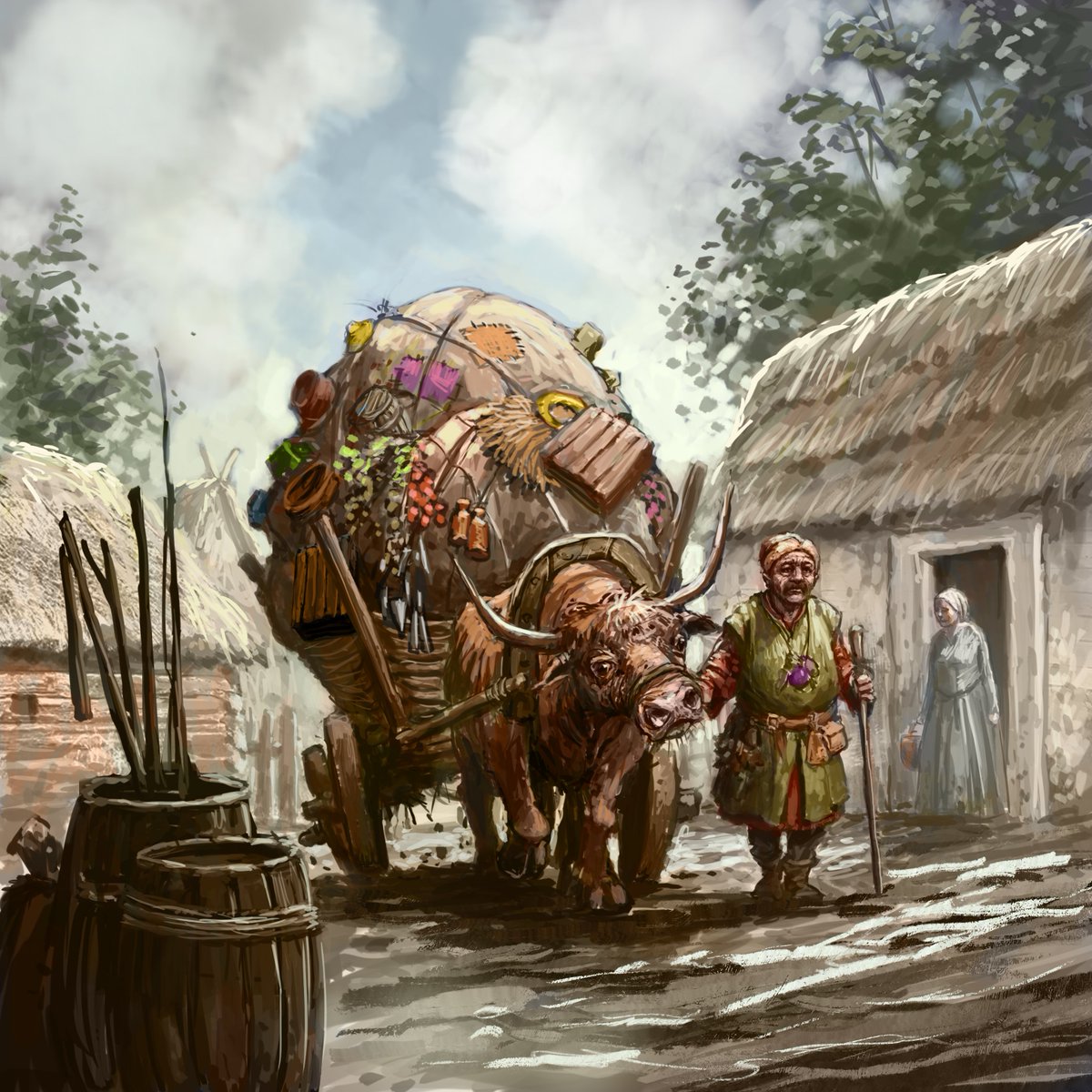
The Daijin are not a warlike people, but they are not afraid to defend themselves and their way of life if necessary. They prefer to solve conflicts through negotiation and mediation, and they have a strong sense of justice and fairness. Although they avoid violence, it is uncommon to find a single carriage rob, the interconnected convoy averages 35 strong with many Daijin within prepared to defend their entire lives that exist above those four wheels.

Daijin Carriage by Pengzhen Zhang

Trader Travelling Into Town by Art from Gord
The Daijin are not a warlike people, but they are not afraid to defend themselves and their way of life if necessary. They prefer to solve conflicts through negotiation and mediation, and they have a strong sense of justice and fairness. Although they avoid violence, it is uncommon to find a single carriage rob, the interconnected convoy averages 35 strong with many Daijin within prepared to defend their entire lives that exist above those four wheels.
Culture
Major language groups and dialects
As with most on the Gaul mainland, the Daijin speak the common tongue. Although both the Shiman and the Daijin have a passed down accent that came from their Dynastan roots, the Daijin in particular have picked up many words and phrases from the various cultures they have spent time with on the coastal road.
Shared customary codes and values
Freedom is the key value of the Daijin people. The ability to do as one pleases and not be held in servitude for any longer than obtaining the means to survival is avoided.
Common Dress code

Merchant

Noble

Nomad Commoner

Ruler

Rural Commoner
Varieties of cultural outfits for the Daijin people
Foods & Cuisine
The Daijin people are expert fishers and foragers. When they rest for the evening their meals almost always consist of fish, small game, berries and slices traded along the way. Many recipes have been gained along the Daijin Road from locals. From the rice of Echose to the giant morels of Vargen the daijin can create a dish no matter where they stop for the night.
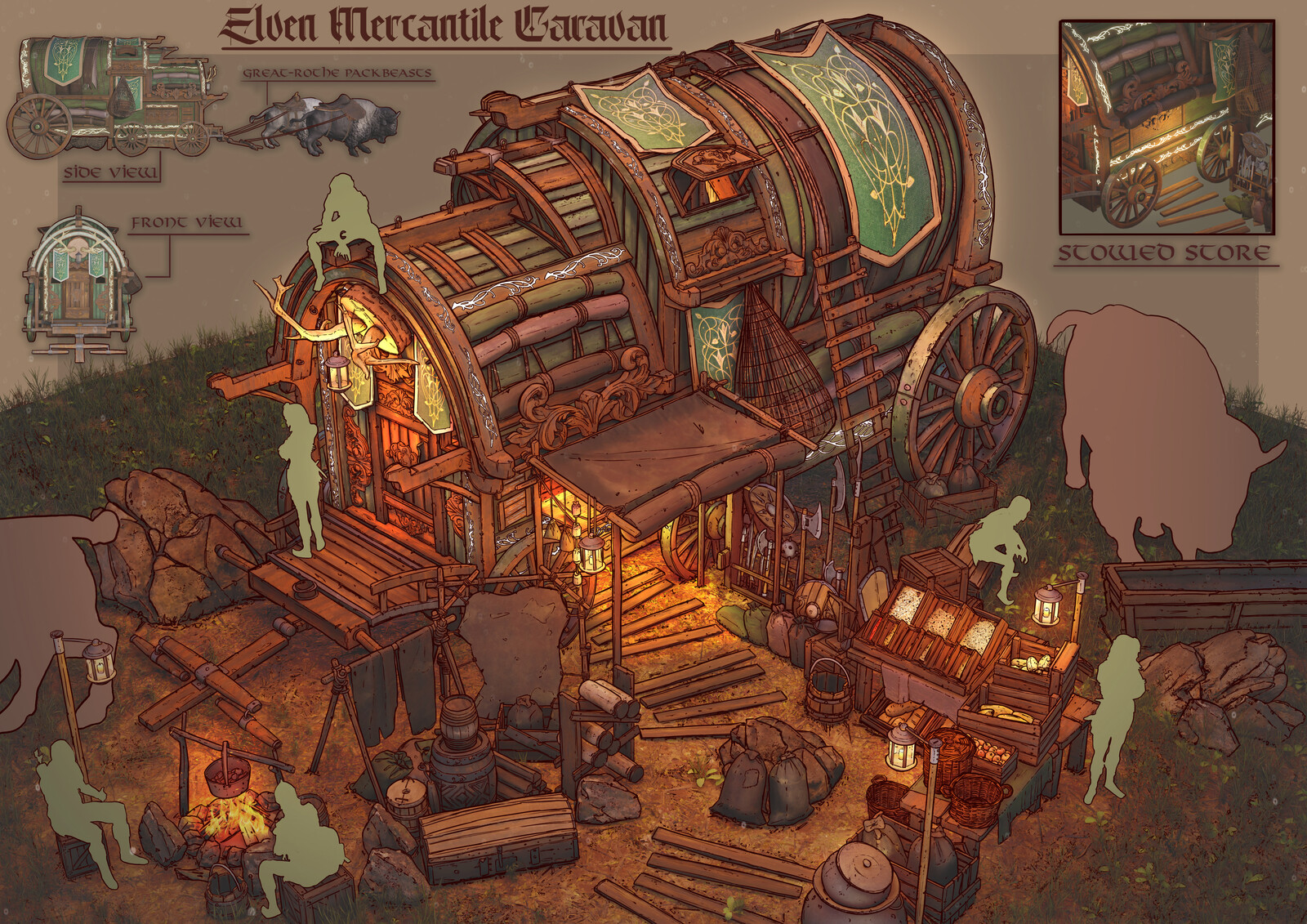

Daijin Cookout by Wesley Phua
Birth & Baptismal Rites
Most births happen on the bumpy roads in the back of a padded carriage bed. Once the mother has had time to meet her baby, the father moves from carriage to carriage showing off the newest member of this nomadic family. The convoy does not stop and all help the new family celebrate.
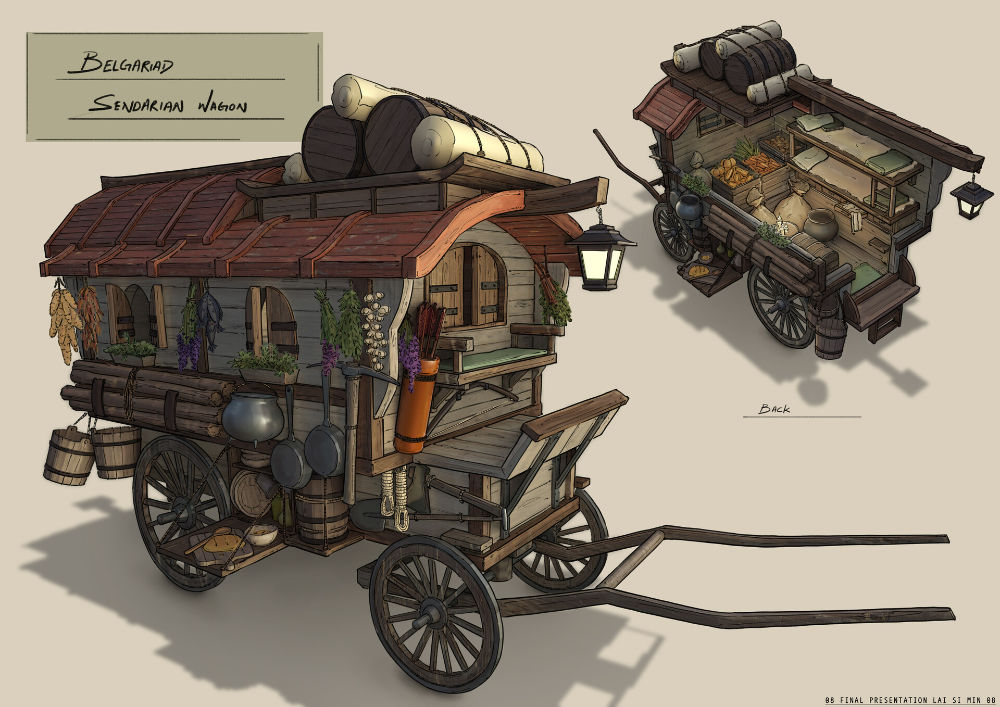

Interior of the Daijin Carts by Lai Si Min
Coming of Age Rites
By the time a Daijin is five they can change a horseshoe on an angry mare. At six they have hung underneath a moving carriage to replace a broken spoke of a wheel that struck a rock too hard. By twelve they have pulled an all nighter at the front if the pack, gently guiding their line of carriages around slippery slopes and over rickety ravines.
Funerary and Memorial customs
When a member of the family dies on the road, no gravestone or plaque is erected. That night around the cookout, songs are sung and poems are spoken. Words of their journey are spread to all the convoy. The trinkets and treasures are passed onto other nomads, ensuring the story in which they received these items is remembered and passed on orally through campfire tale. The entire group helps bury them and mourns with the direct family. In the morning, the horses are fed and the wheels start turning. Daijin die how they lived. Carefree and liberated on the roads built by their ancestors.
Historical figures
Ideals
Courtship Ideals
When two nomadic daijin are courting, they find moments of rest along the journey to sneak away when the conviy has stopped fir the evening. oftentimes if this relationship leads to a family, the couple will return to these off trail spots and begin the foundations of a new road so that others can follow in their footsteps.
in this nomadic culture, letting the convoy move on without you while staying back to tend to another’s weak horse or help fix a broken wheel can be seen as an act of true kindness and be seen as romantic if the people involved are searching for that type of relationship.
Relationship Ideals
Once two people decide they want to plan for marriage, they participate in a Daijin ritual where they are connected by the arm at maximum three arm lengths away and stay entangled for a season of travel. The ribbon often breaks due to difficult terrain or weather, it will be intentionally torn if the convoy is attacked by raiders or brigands on the road. The true test is if both suitors continually retie the knot. They do this fir one season to ensure they want to travel together.
If a couple finds themselves married and was previously living within their family carriages, they will choose to leave the convoy and find work for a season. In that time they will build their new home on wheels and prepare expansions for whatever family they are about to start. Oftentimes the couple won’t wait for their families convoy to return, they will join the first Daijin carriage rain that moves through brown and start their new life on the road.


Encompassed species
Related Organizations


